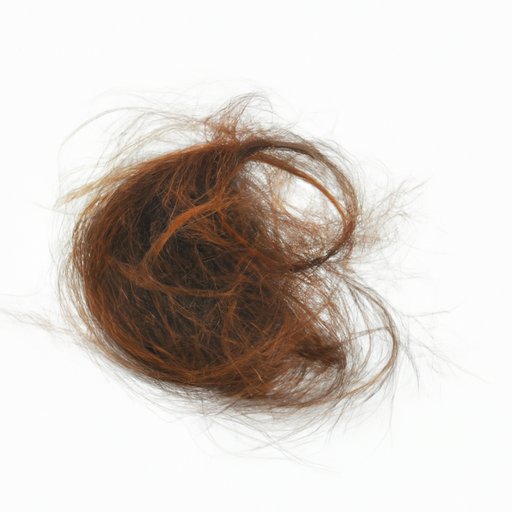Introduction
Hair shedding is a common problem that affects many people. It can have a significant impact on self-esteem and confidence. The average person loses around 50 to 100 hairs a day, but some may experience excessive shedding, which can be caused by a range of factors. If you’re dealing with hair shedding, you’re not alone. In this article, we’ll explore the reasons why hair sheds so much, and provide tips for tackling hair shedding to help you regain your confidence.
The Root Causes of Excessive Hair Shedding and How to Tackle Them
There are many reasons why hair might shed more than usual. One of the most common causes is genetics. Some people are naturally predisposed to hair loss, and there’s not much that can be done to change this. Other causes include age and hormonal imbalances. For example, women going through menopause may experience hair shedding due to fluctuating hormones. If you’re experiencing hair shedding, it’s essential to identify the root cause and take action.
If hair shedding is caused by genetics, there are still ways to tackle it. Topical treatments such as minoxidil can help promote hair growth, while supplements containing biotin and other essential nutrients may also be beneficial. For hormonal imbalances, natural remedies such as black cohosh and evening primrose oil may be helpful. In more severe cases, a doctor may prescribe medication or hormone therapy to address the root cause of shedding.
Breaking Down the Myths and Misconceptions about Hair Shedding
There are many myths surrounding hair shedding, which can make it difficult to understand the condition. For example, some people believe that brushing your hair too often can cause shedding. This isn’t true. Brushing your hair can actually help distribute natural oils and stimulate hair growth. Another myth is that shaving your head will help prevent shedding. In reality, shaving your head doesn’t have anything to do with shedding, and it won’t prevent hair from falling out.
The truth is that hair shedding is a natural part of the hair growth cycle. Hair goes through three stages: anagen, catagen, and telogen. During the telogen phase, which lasts around three months, hair falls out naturally as part of the growth cycle. Shedding only becomes a problem when too much hair is falling out due to causes such as genetics or hormonal imbalances.
Is Your Hair Falling Out Because of Stress? Discover the Connection and What You Can Do
Stress can be a contributing factor to hair shedding. When the body is under stress, it produces the hormone cortisol, which can interfere with the hair growth cycle. Stress can also cause inflammation, which can affect the scalp and hair follicles, making it more difficult for hair to grow.
There are several ways to manage stress to help prevent hair shedding. Relaxation techniques such as meditation, deep breathing, and yoga can help reduce stress levels. Exercise is also a great way to manage stress as it releases endorphins that can improve mood and lower cortisol levels. In some cases, seeking professional help from a therapist or counselor can also be helpful.
How to Find the Right Hair Products and Hair Care Routine to Prevent Excessive Hair Shedding
Using the wrong hair products or not using them correctly can contribute to hair shedding. It’s essential to find the right products for your hair type and use them appropriately. For example, if you have oily hair, you may need a shampoo that’s specially formulated to remove excess oil. If you have dry hair, you’ll want to use a moisturizing conditioner to help nourish and hydrate your strands.
In addition to finding the right products, it’s essential to develop a hair care routine that works for you. This may include washing and conditioning your hair regularly, using a leave-in conditioner or hair oil, and avoiding heat styling tools that can damage your hair. Developing a hair care routine that includes regular trimming and scalp massages can also help promote healthy hair growth and prevent shedding.
What Your Diet Has to Do with Hair Shedding and the Best Foods to Eat for Healthy Hair Growth
What you eat can have a significant impact on the health of your hair. A balanced diet that includes essential vitamins and minerals can promote healthy hair growth and help prevent shedding. Some of the best foods for healthy hair growth include eggs, nuts, fish, leafy greens, and berries.
Protein is particularly important for hair growth. It’s a building block of hair, and without enough protein in your diet, your hair may become weak and prone to shedding. Other essential nutrients include vitamins B and D, iron, and zinc. If you’re not getting enough of these nutrients in your diet, taking a supplement may be helpful.
Conclusion
In conclusion, excessive hair shedding can be a challenging problem to deal with. However, by understanding the root causes of shedding and taking steps to tackle the problem, it’s possible to promote healthy hair growth and regain your confidence. Some of the key takeaways from this article include identifying the root cause of shedding, developing a hair care routine that works for your hair type, managing stress, and eating a balanced diet. If hair shedding persists, it’s essential to seek medical attention to identify any underlying health conditions.
